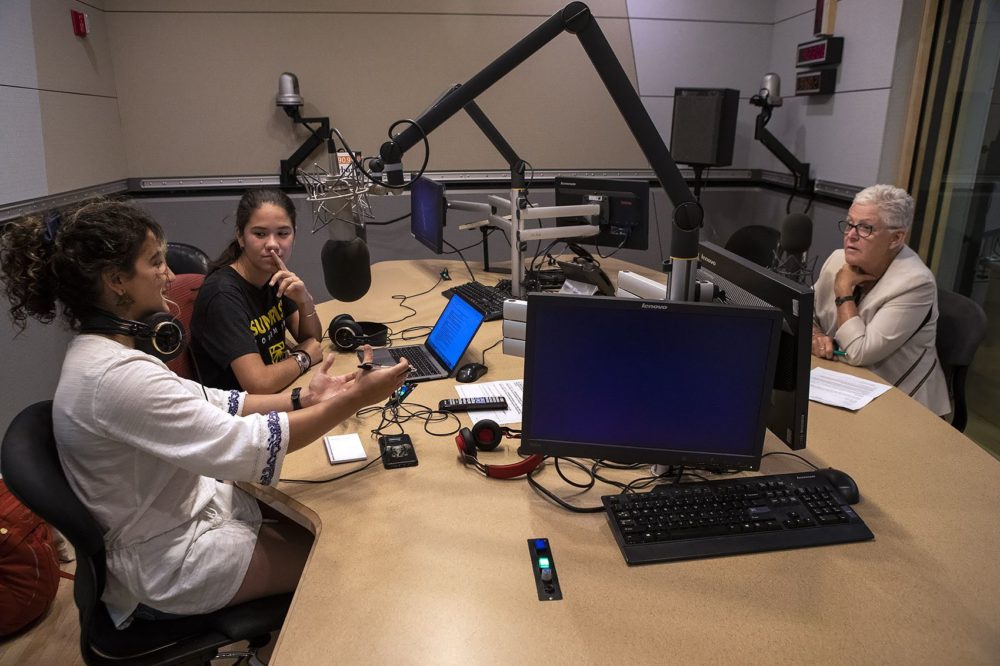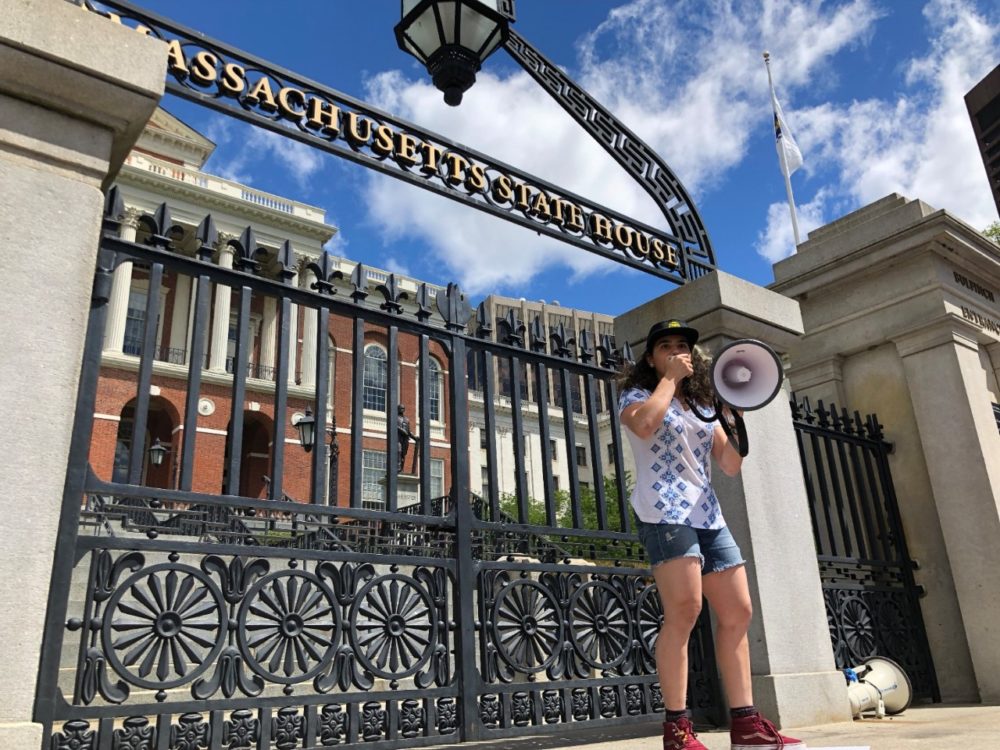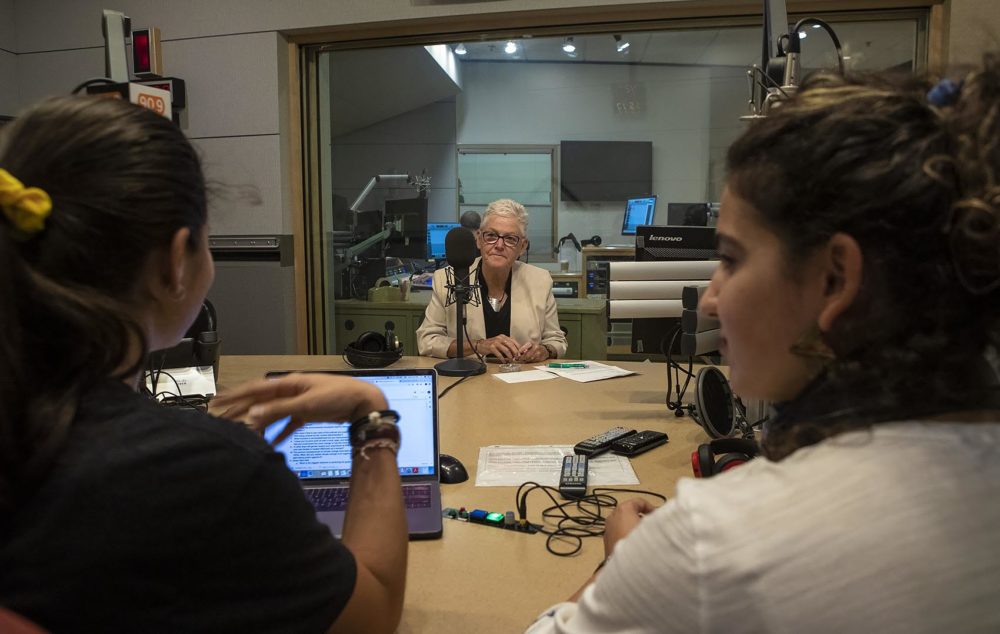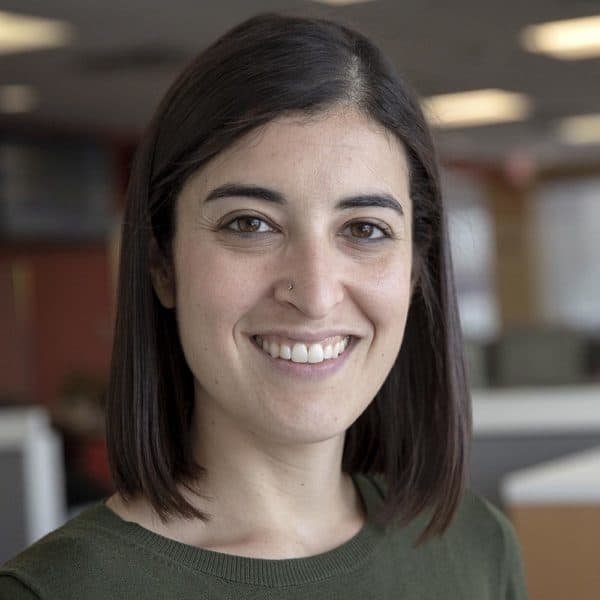Advertisement
Covering Climate Now
Former EPA Head To Young Climate Activists: Drive Your Parents Crazy
Resume
From the school-skipping 16-year-old Swedish activist raising global awareness about climate change, to the Green New Deal and the emergence of the Sunrise Movement across the U.S., young people are leading the charge for environmental change and action.
While youth climate activism is not a new phenomenon, the dire warnings about inaction give today's movement a heightened urgency.
Former Environmental Protection Agency Administrator Gina McCarthy sat down with two young Boston-area climate leaders — 17-year-old Saya Ameli Hajebi and 18-year-old Audrey Lin — to talk about what drives them and the challenges they face.
Here are some highlights from their conversation:
Saya Ameli Hajebi: What got you started on the path to climate policy? Did you do any climate activism like Audrey and me?
Gina McCarthy: Back in the '70s and '80s, I was really interested in all of the pollution that was happening. I was worried about the pollution from smokestacks. I was worried about all of the paper that was being thrown out the window. I was worried about lead paint. I was worried about things you could see and feel and touch.
And when I started to hear about climate change, I realized that it was such a big deal, but people couldn't feel it and see it and taste it. It always felt like a far away big thing that you couldn't do anything about. So when I started to get active in it, it was to try to show people that it was real and we could do something about it.
I can't say that I've been a huge activist in my life, but I've never been a conformer either. When I was a kid, we were always driving our parents crazy to get them to pay attention. And I expect that you have the same journey. You’re trying to drive me and others of my age crazy — and you should, because we have to change our thinking.
I’m interested in why climate change has become such a big part of your agenda?
Hajebi: My family moved here from Iran about eight years ago. In Iran, I lived in one of the most polluted cities of the world: Tehran. And the moment that I finally saw that difference was when I stepped off the plane at Logan Airport in Boston — I looked up, and the sky was actually blue.
I want to channel that feeling every time I talk to people my age. I want to channel that when I talk to the greater population of people to show just how close and personal these climate change issues are. They’re right here, they’re right next to us. It’s just sometimes we don’t see them.
Audrey Lin: I think for a lot of kids our age, we’ve just kind of always grown up knowing about global warming, knowing about climate change. But I didn’t really understand the urgency of this issue until my sophomore year of high school when [I was] writing a research project. I just had this moment of, “Oh my gosh. Climate change impacts everything that I know.” And this has really pushed me toward taking action.

McCarthy: I can’t tell you how much it sparks energy to have young people engaged in these issues, because it just reminds us of the sort of tie-dye t-shirts and bell-bottoms we used to wear when we were marching in the streets. Do you get a lot of challenges about why are you doing this? About why you aren't in school?
Lin: Yeah, my grandfather doesn't understand the urgency of this crisis. I am currently on a gap year, which I took specifically because I wanted to work with Sunrise Movement. My grandfather just couldn’t understand that. He just doesn’t get it. So, that’s definitely been challenging.
McCarthy: But the important thing is you still love your grandfather, right?
Lin: Yes, I do. For me, this has definitely been understanding a “both, and.” That he is both in relative denial of climate change, and he’s my grandfather and I love him a lot.
McCarthy: And he loves you as well, I’m sure. So probably in the back of his mind he’s dwelling on why this is such a big deal to you. And I think that’s a good thing. One of the things I’ve really been bothered by is an inability to make climate change part of everyday conversation.
Hajebi: How do you stay optimistic?
McCarthy: You can’t be unrealistic about the challenge, but you have to be hopeful for the future. And right now, it’s very difficult for me because I ran the Environmental [Protection] Agency in Washington D.C. — EPA — and a lot of what we did during the Obama administration is now being undone or attempted to be undone by this administration. So you’ve really got to take a deep breath and say, “What we did was right. What we did followed the science. And we’re going to win in the end.”

Lin: One of the things that I appreciate the most about the Green New Deal, it is a resolution that really uplifts people on the front lines of poverty and pollution, and is really looking to address the social wrongs that have been going on so much in our country. I'm curious what you believe are the biggest obstacles to achieving the goals of the Green New Deal?
McCarthy: That’s a really good question. I think most people see it as being daunting because it tries to do so many things at once. But honestly, I’m so excited that it’s part of the conversation. And I don't believe it would be if it wasn’t for the Sayas and the Audreys of the world.
So I want to make sure that anybody your age recognizes that when an administration like this may not be paying attention, it’s not the end of the discussion. It’s not the end of your opportunity to make progress, right?
Lin: Yeah, we’re going to stay super hopeful. I am hopeful.
McCarthy: If anybody tells you you’re wasting your time, Audrey or Saya — you are not wasting your time. You’re doing our business. You’re working in a democratic process. And you’re making this country work better. And I am so proud of you.
This story is part of "Covering Climate Now," a week-long global initiative of over 250 news outlets.
This segment aired on September 15, 2019.
